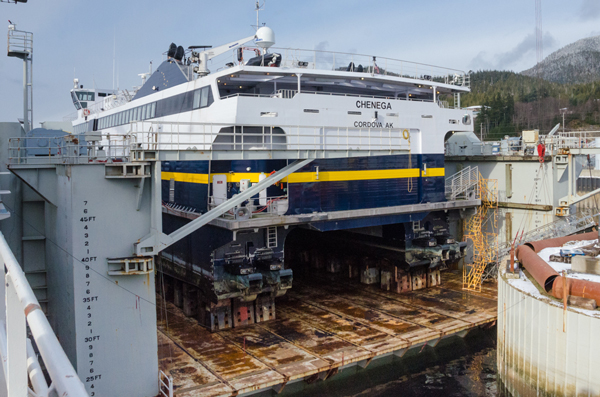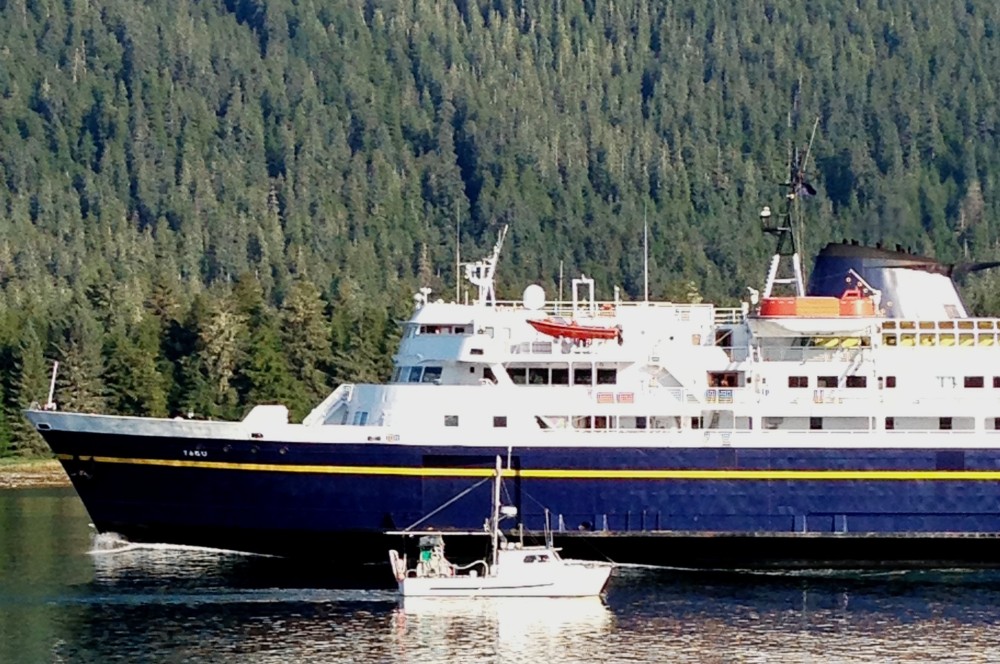
The Alaska Marine Highway System is paying more than $1,200 a day for long-term storage of two unused ferries.
One critic says it would be better to sell them than to tie them up.
The state has awarded contracts totaling more than $450,000 to tie up the ferries Taku andChenega for the next year.
The ferry system already docks a number of ships each winter when lower passenger numbers drop the demand.
But this is different.
Spokesman Jeremy Woodrow said they’re being completely shut down and emptied of fluids. The Taku is being towed to a storage site in Ketchikan’s Ward Cove. The Chenega is headed to the Vigor Shipyard in Tacoma, Washington.
“The vessel will be unmanned. That’s part of the cost. The company will be in charge of the vessels’ keeping,” he said.
Ferry managers have a clear take on the future of the Taku.
They plan to sell the 50-year-old mainline vessel, which can hold up to 350 passengers and 50 cars or trucks.
But Woodrow says that will take a while.
“It’s not just listing it on eBay tomorrow,” he said. “There is a process to go through procurement and we’re working on that process.”
EBay is how the Bartlett, a smaller ferry, was sold in 2003.
The Chenega’s future is less clear.
It’s much younger, beginning service only 11 years ago. It has a smaller capacity — 210 passengers and about 30 vehicles.
Unlike the Taku, it has no staterooms or full-service cafeteria.
The Chenega and its sister ship, the Fairweather, were designed to provide faster, shorter sailings that some predicted would be the future of the marine highway system.
“No discussion of selling or of retiring the Chenega at this point or either of the fast ferries,” he said. “The only ship we’re looking at now is the Taku.”
“It doesn’t make any sense,” said Petersburg’s Dave Kensinger, who owns a regional produce business that depended on the ferry system before service cuts made it impractical.
He’s also a member of a committee coming up with a new Alaska Marine Highway System management structure.
“We don’t have enough money and we probably won’t have enough money in the future to maintain and operate the fleet that we currently have. So, at some point you just have to cut your losses,” he said.
He likes the fast ferries. But he says their fuel and maintenance costs are just too high.
“If you gave me a choice between riding in a Volkswagen or riding in a Maserati, yeh, I’d love to ride in a Maserati. But, guess what? If you gave me those vehicles, I couldn’t afford to even put the gas in a Maserati, let along pay the maintenance bill for it,” he said.

The new committee he’s on was set up by the marine highway and the Southeast Conference, the regional development group pushed to build the first ferries back in the 1950.
It’s looking at different models for running the system which include researching other ferries and how they’re governed.
“That’s how transportation’s run all over the free world. It’s not directly operated by the executive (branch),” he said. “You don’t have the mayor running the bus system. You don’t have governors running rail systems or ferry systems in most other places in the world.”
The one-year, $450,000 price for tying up the Taku and Chenega includes some towing and set-up costs.
Future years, if they’re needed, will cost about 25 percent less.
And Woodrow says the storage fee will be prorated when one or both ships are sold or returned to service.
Ed Schoenfeld is Regional News Director for CoastAlaska, a consortium of public radio stations in Ketchikan, Juneau, Sitka, Petersburg and Wrangell.
He primarily covers Southeast Alaska regional topics, including the state ferry system, transboundary mining, the Tongass National Forest and Native corporations and issues.
He has also worked as a manager, editor and reporter for the Juneau Empire newspaper and Juneau public radio station KTOO. He’s also reported for commercial station KINY in Juneau and public stations KPFA in Berkley, WYSO in Yellow Springs, Ohio, and WUHY in Philadelphia. He’s lived in Alaska since 1979 and is a contributor to Alaska Public Radio Network newscasts, the Northwest (Public Radio) News Network and National Native News. He is a board member of the Alaska Press Club. Originally from Cleveland, Ohio, he lives in Douglas.




